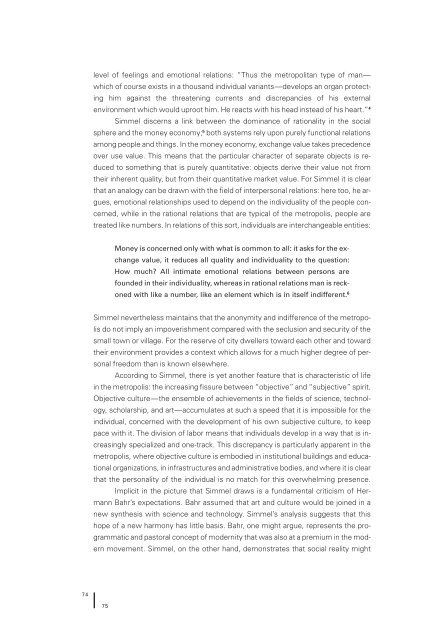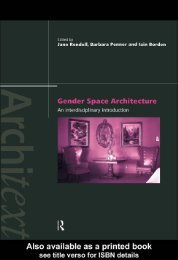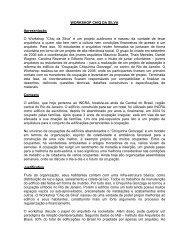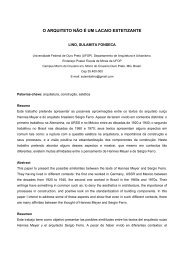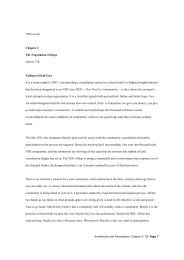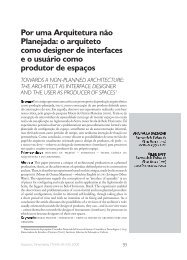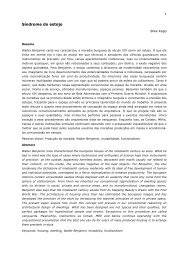Architecture and Modernity : A Critique
Architecture and Modernity : A Critique
Architecture and Modernity : A Critique
Create successful ePaper yourself
Turn your PDF publications into a flip-book with our unique Google optimized e-Paper software.
74<br />
level of feelings <strong>and</strong> emotional relations: “Thus the metropolitan type of man—<br />
which of course exists in a thous<strong>and</strong> individual variants—develops an organ protecting<br />
him against the threatening currents <strong>and</strong> discrepancies of his external<br />
environment which would uproot him. He reacts with his head instead of his heart.” 4<br />
Simmel discerns a link between the dominance of rationality in the social<br />
sphere <strong>and</strong> the money economy; 5 both systems rely upon purely functional relations<br />
among people <strong>and</strong> things. In the money economy, exchange value takes precedence<br />
over use value. This means that the particular character of separate objects is reduced<br />
to something that is purely quantitative: objects derive their value not from<br />
their inherent quality, but from their quantitative market value. For Simmel it is clear<br />
that an analogy can be drawn with the field of interpersonal relations: here too, he argues,<br />
emotional relationships used to depend on the individuality of the people concerned,<br />
while in the rational relations that are typical of the metropolis, people are<br />
treated like numbers. In relations of this sort, individuals are interchangeable entities:<br />
75<br />
Money is concerned only with what is common to all: it asks for the exchange<br />
value, it reduces all quality <strong>and</strong> individuality to the question:<br />
How much? All intimate emotional relations between persons are<br />
founded in their individuality, whereas in rational relations man is reckoned<br />
with like a number, like an element which is in itself indifferent. 6<br />
Simmel nevertheless maintains that the anonymity <strong>and</strong> indifference of the metropolis<br />
do not imply an impoverishment compared with the seclusion <strong>and</strong> security of the<br />
small town or village. For the reserve of city dwellers toward each other <strong>and</strong> toward<br />
their environment provides a context which allows for a much higher degree of personal<br />
freedom than is known elsewhere.<br />
According to Simmel, there is yet another feature that is characteristic of life<br />
in the metropolis: the increasing fissure between “objective” <strong>and</strong> “subjective” spirit.<br />
Objective culture—the ensemble of achievements in the fields of science, technology,<br />
scholarship, <strong>and</strong> art—accumulates at such a speed that it is impossible for the<br />
individual, concerned with the development of his own subjective culture, to keep<br />
pace with it. The division of labor means that individuals develop in a way that is increasingly<br />
specialized <strong>and</strong> one-track. This discrepancy is particularly apparent in the<br />
metropolis, where objective culture is embodied in institutional buildings <strong>and</strong> educational<br />
organizations, in infrastructures <strong>and</strong> administrative bodies, <strong>and</strong> where it is clear<br />
that the personality of the individual is no match for this overwhelming presence.<br />
Implicit in the picture that Simmel draws is a fundamental criticism of Hermann<br />
Bahr’s expectations. Bahr assumed that art <strong>and</strong> culture would be joined in a<br />
new synthesis with science <strong>and</strong> technology. Simmel’s analysis suggests that this<br />
hope of a new harmony has little basis. Bahr, one might argue, represents the programmatic<br />
<strong>and</strong> pastoral concept of modernity that was also at a premium in the modern<br />
movement. Simmel, on the other h<strong>and</strong>, demonstrates that social reality might


